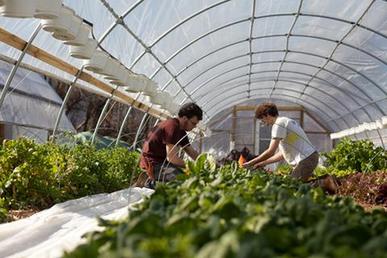分享到

This is the VOA Special English Agriculture Report.
Old properties and empty lots in cities and towns around the United States are finding new life as urban farms.
Eco City Farms in Edmonston, Maryland, is located near shopping centers, car repair shops and homes. The neighborhood is a working-class community. People do not have very much money, and they have limited access to fresh food in markets.
Over the past two years, the farm has attracted volunteers from the community like Marcy Clark. She schools her four children at home. On a recent day she brought them to Eco City Farms for a lesson.
Her children harvested rows of spinach, mustard greens, lettuce, Swiss chard and carrots. What did Hannah, Caleb, John and Alston think of the experience?
HANNAH CLARK: "You know, it's good for the earth and it's good for us."
CALEB CLARK: "It may not be like fun, fun, but it's fun, 'cause you're learning and not, like, writing something out on a piece of paper."
JOHN CLARK: "Basically instead of feeling down when I have to eat vegetables, I feel happy."
ALSTON CLARK: "I like coming out here. You know, you connect with the earth, where your food comes from. You appreciate the food a little bit more."
Margaret Morgan-Hubbard started Eco City Farms. She thinks of it as a place where people can learn to live healthier lives.
MARGARET MORGAN-HUBBARD: "Our view is that what happens in a community, influences the culture of that community. So our idea was growing food in a community and showing that you can have farms even in urban areas, redefines what's possible in that area, in that community and brings people together."
"Every piece of what we do here is a demonstration to show people everything about how to have a sustainable community," she says. That means not only farming food and raising chickens and bees, but improving the soil with compost made from food waste. Sixteen wooden bins are filled with worms. Their job is to eat the food waste and help make it into compost.
Benny Erez is a technical adviser at EcoCity Farms.
BENNY EREZ: "When people come and look at this, obviously we show them a technique, a technique how to take food waste and close the circle and bring the food back from being food to composted and then use it on the farm, back to growing vegetables and back to people, and it's basically closing the loop."
Eco City Farms is an "off the grid" experimental operation. The farm gets its power not from the local electricity grid but from the sun with solar panels. In winter, the greenhouses are heated using a geothermal system. Buried tubes pump air at underground temperature -- 13 degrees Celsius -- into the structures.
Vegetables can be grown all year. So once a week, all winter long, neighbors like Chris Moss and her three children bicycle to the farm to pick up a share of the harvest. What does five-year-old Owen Moss think of it?
OWEN MOSS: "I like eating the vegetables."
And that's the VOA Special English Agriculture Report. You can find two videos about EcoCity Farms -- including one about the composting worms -- at voaspecialenglish.com. I'm Jim Tedder.
spinach: 菠菜
mustard greens: 芥菜
lettuce: 生菜;萵苣
Swiss chard: 唐萵苣(甜菜之一)
compost: 混合肥料,堆肥
geothermal: 地熱的;地溫的
Farming in the city: the joys of growing food
Putting agriculture at the center of climate talks
Prawns and tobacco find a home together on some farms
(來源:VOA 編輯:Rosy)
分享到
關注和訂閱


電話:8610-84883645
傳真:8610-84883500
Email: languagetips@chinadaily.com.cn